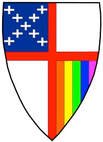|
While last week we were wrestling with snakes, it is fitting that this week we celebrate St. Patrick’s feast day who is famously said to have driven all of the snakes out of Ireland.
(Actually, scientists believe snakes disappeared from the island during the Ice Age.) Nevertheless, we like the image of St. Patrick driving them out - and conquering those evil “heel biters”…. I don’t know how many of you know his story: Patrick was actually an Englishman born in 390. His father was a deacon in the church. His grandfather was a priest. They lived on the NW Coast of England…. And Patrick was captured as a teenager and enslaved in Ireland. He was sold to a chieftain and tended sheep. He escaped about six years later when he was twenty-one - and was able to get back home to England. Patrick wrote about his captivity in his memoir The Confession. While Patrick had considered himself more of an atheist growing up (even with the Christian upbringing) his prayer life in captivity grew strong. Patrick came to know God and Jesus during that time of struggle. He had the types of divine encounters that mystics experience. Hearing the voice of God. St. Theresa of Avila called these locutions… In one account he spoke about how in a dream he was trying to pray, but seemed unable to - and then he heard a voice coming from inside of him which he realizes is the voice of God praying for him. Like God says in Jeremiah, “…I will put my law within them; and will write it on their hearts.” That will be the new covenant. And the Psalmist says: With my whole heart I seek you; * let me not stray from your commandments. I treasure your promise in my heart, * Patrick experienced that promise of God within. Now, what is even more special about Patrick, is that even after all of that suffering, he returns to Ireland as a missionary to bring the Irish the good news of Christ. Patrick is said to have baptized over 120,000 Irishmen and planted 300 churches. In fact Ireland is the only country that basically had a full on conversion to Christianity - as a Peaceful conversion…Christianity didn’t supersede their pagan beliefs, rather it embellished, and improved upon the story that they already knew in nature. Christianity was a fulfillment of the Glorification of Creation through the Son of God; And through this idea of One God who loves us all. __ The Glorification of God is mentioned in our Gospel passage today - and John writes about the glorification of God throughout his Gospel. When Jesus says, let me glorify your name. God responds, “it has been glorified and it will be again.” Jesus had through his life, his work and his struggle glorified God continually in his love. We tend to focus only on this rising up - this glorification through the Crucifixion… but that certainly is not all that John meant in his Gospel. John emphasizes the ascension. Jesus is raised up… and it is the raising up that is promised to all of us. …And not simply through the promise of resurrection at death.. but being raised up through a life in Christ as we listen for our God within; as we recognize the beauty of our God without (all around us); the glory of God in the abiding promise that no more will we be alone. We are God’s people. God is written in our hearts. In recent chapters, Jesus is speaking about losing our lives to save them. Again he speaks of this through the metaphor of the grain of wheat. The grain, is a simple grain of wheat -until it falls, is broken open, buried…fertilized…then it bears fruit. Jesus is talking about the Kingdom of God… he is not only speaking about his death, which will bear the fruit of God’s love known in the World. He is speaking about how we glorify God too. The Greek term “life” in this Gospel is related to psyche. How do we let go of our small egos - how do we learn to let go of resentments, clinging, and self-righteousness? In this type of dying to the small self - in this dying to self and rising to Christ, we help fertilize a field for others to grow in God’s love. We plant seeds that bear fruit. At the end of our passage, Jesus say, “Now my soul is troubled. And what should I say - ‘Father, save me from this hour’? No, it is for this reason that I have come to this hour.” Perhaps that is what Patrick realized through his suffering; That the Word had become flesh - and that even the people that enslaved him were meant to be part of the fruit of God’s great creation. The term “he had come to his hour”…is not only about death. A pregnant woman about to give birth, was also said to have “come to her hour.” The fruit of Jesus is about to be born for the world in us. What enslaves you -and how might you rise to the challenge of the Glory of your life in God? How have others around you been enslaved? How can you participate in the rising of others - -your loved ones, your community, even so called strangers? The missionary work that Patrick brought to Ireland was reconciling work. It was the healing work of God. Patrick understood that Christ belongs to the whole world. While we may not be adventuring into what we traditionally think of as missionary work like Patrick; we are called to be missionaries of God’s healing in this community. Heart to Heart. This is the field where we will be raised up. And God’s name will be glorified again through us. As our collect says today: “Grant your people grace to…desire what you promise; among the swift and varied changes of the world, our hearts may surely there be fixed where true joys are to be found…”
0 Comments
Leave a Reply. |
AuthorThe Rev. Heather K. Sisk Archives
July 2024
Categories |
We Would Love to Have You Visit Soon!
WE ARE ALL MADE IN THE IMAGE OF GOD |
Telephone845-635-2854
|
|
 RSS Feed
RSS Feed

